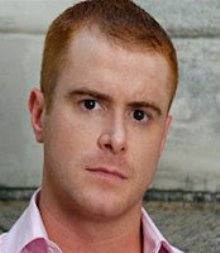|
|
 |
1st
T Script Writing Contest
Winners
|
2016 CONTEST |
ENTER NOW
Winners |
Biography |
Logline |
Interview |
Script Excerpt
Waterloo
American Gem Short Script Contest
|
GRAND PRIZE WINNER |
|
 |
|
TV Pilot
Waterloo
Drama
Chuck Griffith
of
Los Angeles, CA United States |
|
Biography
Chuck Griffith
An alumnus of
Columbia University, where he received his B.A. and M.A.,
Chuck Griffith studied television directing on the set of
HBO's "Six Feet Under" with director Kathy Bates, and the
single camera sitcom "Undeclared" on FOX with director Greg
Mottola. Chuck also served as a producer for MTV's popular
award-winning reality series, "Made" in 2007 and 2008. He
was also a story consultant on "In The Blood".
Griffith directed his feature film debut, "Thank You, Good
Night". "TYGN", starring Mark Hamill ("Star Wars"),
Christian Campbell ("Reefer Madness"), Sally Kirkland ("JFK"),
and John Paul Pitoc ("Six Feet Under"), garnered high praise
at film festivals across the country and won a Jury Prize
award for best feature film. He co-wrote the lyrics for the
movie's hit songs, "Not in High School Anymore" and "Fifth
of July". After a hiatus from film to work in digital
marketing--redefining customer brand experiences for
Emirates, Salesforce, Visa, Pokemon, and many others
firms--Griffith returned to directing in 2015 with the
festival winning short film "No Woman's Face Remember",
which he also wrote.
Logline
A New York City
playboy decides to move back to his hometown in Waterloo,
Iowa to take over his late uncle's tractor company.
Interview Part 1.
I knew I wanted to be screenwriter when
growing up in a broken home in Orange County, California,
and later in my teen years in Waterloo, Iowa, the only
escape I had were my weekly trips to the multiplex cinema.
I was ten years old washing cars just to make enough money
to afford a matinee, then sneak into the other
theaters--anything just to not be home. I saw
everything--rated R movies like NIGHTMARE ON ELM STREET or
even random James Brooks movies like BROADCAST NEWS. When I
couldn't get to the movies I would write stories in my head,
locking myself in my room for hours making up television
shows and recording them on audio cassette--full with
narration and making fake commercials.
I know I've succeeded when anyone
transacts with my writing. The best is when someone gives
me a note that shows they really took the time to read my
material. As a film director, it's difficult to not "direct
behind the keyboard" when I write. The details have to be
just enough to give the reader context, but it's very
gratifying to see when the reader brings their imagination
to the work as well.
My
inspiration to write Waterloo...
I've always felt that Waterloo, Iowa is a microcosm for
whatever is going on in America. As cliché as it sounds,
it's a city that has had to reinvent itself so many times
from so many failures. Factories have come and gone, crime
invades the city in spurts as its nestled between the drug
trafficking corridor between St. Louis and Minneapolis/St.Paul,
known as "Avenue of the Saints", in a state with
political significance with the Iowa Caucuses, and a small
city with racial tension divided by the Cedar River. It's
GREEN ACRES meets THE WIRE.
Interview Part 2.
FilmMakers
Magazine: What
inspired you to write?
Chuck Griffith:
I got my first
typewriter...yes, TYPEWRITER, when I was eight years old.
My grandmother bought me one because she noticed I read so
much. She told me stories don't write themselves. It all
started with typed out poetry drenched in whiteout.
FilmMakers Magazine: Is this your first script
and how long did it take you to complete?
Chuck Griffith:
Waterloo is the
first script I've written that has gained much more traction
for me than anything else--screenplay or otherwise. I've
been writing screenplays for year, but took a break to work
on a novel and get a day job in advertising. Waterloo's
story started out a bit thin ten years ago, but I knew
something was there when I revisited it last year. The
winning draft is a year's worth of weekly, sometimes daily,
rewrites after a long workday.
FilmMakers Magazine: Do you have a set
routine, place and time management for writing?
Chuck Griffith:
Because writing
isn't my primary vocation, I usually default to Saturday
mornings and Sunday evenings for scheduled writing times. I
like to marinate an idea for a while, which typically
results in a trip out of town or the country to get
inspired. The tough part is having so many plans for future
episodes and unsure if they'll ever get made into a real
show. I have a detailed outline of the first season with a
broader vision for a five-season arc.
FilmMakers
Magazine: Do you believe screenplay contests are
important for aspiring screenwriters and why?
Chuck Griffith:
Absolutely. I
don't recall hearing much about them ten years ago, but the
internet has changed all of that. Services like FilmFreeway
and Withoutabox really help surface so many contests. 1st TV
Script Writing Contest has a great process in allowing
revised submissions as each round advances. I paid for the
extra script coverage, which nurtured my writing along. It
was like a workshop and very motivating to know a reader was
transacting with the work.
FilmMakers
Magazine: What influenced you to enter the
1st TV Script Writing Contest?
Chuck Griffith:
1st TV Script
Writing Contest felt like it was going to take the process
very seriously. I mean, WATERLOO is my first TV script and
I was sort of writing in the dark. I read advice on how to
write for television in books and online, but this contest
attracted me because it was for that first TV script and
wanted to help nurture or launch a career.
FilmMakers Magazine: What script would you
urge aspiring writers to read and why?
Chuck Griffith:
THE SQUID AND THE
WHALE by Noah Baumbach--granted, not a TV script, but with
the way storytelling has advanced with more premium
cinematic flare in television such as AMC and Netflix,
writers should be working from great scripts. SQUID is one
of those screenplays that inspires saying so much while at
the same time being extremely economical in word choice.
FilmMakers
Magazine: Beside screenwriting what are you passionate
about and why?
Chuck Griffith:
I'm very
passionate about filmmaking in every capacity, especially as
a director. I'm very visual, so I enjoy traveling and
seeing what's out there in the world. I have an education
degree and used to be a teacher, so I volunteer a lot with
kids and art.
FilmMakers Magazine: Who is your favorite
Screenwriter and Why?
Chuck Griffith:
Philip Roth.
AMERICAN PASTORAL was one of the most moving books I ever
read. In fact, thinking about that now I realize that the
novel may have subconsciously been a template for some of
WATERLOO. Roth is one of those narcissistic writers
unafraid to write himself into his work as an alter-ego or
someone he always wanted to be. While I'm not WATERLOO's
Jarett, we share many qualities and is a different "me" that
could have been.
FilmMakers
Magazine: Name the director you would love to work with
and why?
Chuck Griffith:
Kathy Bates. I
had the opportunity to shadow Kathy on her directing work
for SIX FEET UNDER. Everyone respected her a great deal on
the set and she knew everyone's name...down to the
electrician. Her directing approach brings out an actor's
best with the script, working efficiently under an intense
TV shooting schedule. She allows her actors to explore and
go off-script, filming all of it. When she catches the
nuances in an actor's choice, she runs with it and gets the
camera in tighter on it.
FilmMakers
Magazine: Name the actor you would love to work with and
why?
Chuck Griffith: Corbin Bernsen. I grew up watching
LA Law on a small black and white Radio Shack TV given to me
when I was eight. I would stay up past bedtime on Thursday
nights in my bedroom and watch it under a blanket, so it
wouldn't be too loud. Corbin was the cool lawyer, Arne
Becker, who you always wanted to cheer on, even if a bit
flawed. Corbin commands the screen in a way that keeps me
watching. He's the archetype for WATERLOO's Thomas Stockard.
FilmMakers Magazine: Any tips and things
learned along the way to pass on to others?
Chuck Griffith:
Pay for coverage and submit it often. The only way to get
better is peer review and constant feedback. Friends
reading your work is too insular because they know you.
Soliciting professional feedback and getting detailed notes
pays off.
FilmMakers Magazine: What's next for you?
Chuck Griffith:
My short film, NO WOMAN'S FACE REMEMBER, is wrapping up a
world tour at several festivals this year in Cannes at the
Short Films Corner. After that, I'm hoping to write a
feature screenplay idea I've been developing for a couple of
years. I'm eagerly trying to obtain representation and open
to possibilities in getting back into the industry.
FilmMakers Magazine: Where do you see yourself in
five years from now?
Chuck Griffith:
I hope I'm on my way to being a show runner or at least a
head writer for a binge-worthy TV series.
top of page
Important disclaimer
Copyright
© 1999-2016 by FilmMakers.com All rights reserved.
FilmMakers.com
is a division of Media Pro Tech Inc.

|


